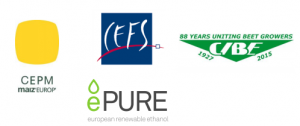 The European ethanol industry is coming together in defense of ethanol as the European Commission has publicly announced that it is considering a gradual phase out of first generation biofuels produced from multiple crops including sugar beet, oilseed rape, wheat and corn. In a letter, the organizations are calling on the Commission to re-evaluate its position. All forms of ethanol, the letter states, is shown to be available and sustainable as well as saves Europeans money at the pump all while reducing emissions from the transport sector. The letter was jointly submitted by the European Association of Sugar Manufacturers (CEFS), the European Confederation of Maize Production (CEPM), the International Confederation of European Beet Growers (CIBE) and the European renewable ethanol producers association (ePURE).
The European ethanol industry is coming together in defense of ethanol as the European Commission has publicly announced that it is considering a gradual phase out of first generation biofuels produced from multiple crops including sugar beet, oilseed rape, wheat and corn. In a letter, the organizations are calling on the Commission to re-evaluate its position. All forms of ethanol, the letter states, is shown to be available and sustainable as well as saves Europeans money at the pump all while reducing emissions from the transport sector. The letter was jointly submitted by the European Association of Sugar Manufacturers (CEFS), the European Confederation of Maize Production (CEPM), the International Confederation of European Beet Growers (CIBE) and the European renewable ethanol producers association (ePURE).
The organizations states that a phase out of conventional biofuels will cost European farmers billions of Euro in revenue per year – a phase out of conventional ethanol alone, which represents only 20 percent of the EU biofuel market, will cost European farmers at least €2.1 billion revenue per year.
The letter goes on by explaining to the Commission that ethanol will continue to be vital to meeting Europe’s greenhouse gas reduction goals – 18 to 19 percent in the road transport sector. This is the case, the organizations write, because other forms of transportation such as electric vehicles will not ramp up quickly enough to have any significant impact on reducing the sector’s GHG emissions by 2030. In addition, the letter continues, electricity remains heavily dependent on fossil fuels.
The organizations highlighted several climate and energy benefits of ethanol:
- European ethanol has certified and audited average high GHG emissions savings of 64%
compared to petrol. European ethanol’s strong GHG emission savings performance has been
constantly improving and is supported by the Commission’s own scientific studies. In 2015,
European ethanol companies produced 4.5 billion litres of renewable ethanol fuel, reducing
GHG emissions by 6 million tonnes – equivalent to the annual emissions produced by 4
million new cars. - In 2015 the use of European produced ethanol displaced the need for 19 billion barrels of
petrol in European transport – equivalent to nearly 4% of Europe’s petrol volumes.
The letter outlines why the Commissions strategy is wrong and states that the sustainability industry can and should be strengthened. The letter continues, “An unjustified phase out of conventional ethanol will hurt Europe’s farmers and would be an unacceptable abdication of the Commission’s responsibility to protect the existing €16 billion biofuel investments that have been made in good faith and the 220,000 jobs created by the biofuel sector on the basis of existing policy. The European ethanol industry alone has invested €8 billion.”

